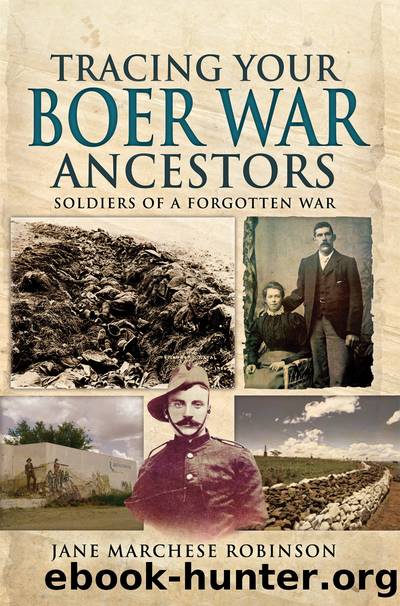Tracing Your Boer War Ancestors by Jane Marchese Robinson

Author:Jane Marchese Robinson
Language: eng
Format: epub
Publisher: Pen and Sword
Published: 2016-01-15T00:00:00+00:00
Chapter 7
THE BITTER END
When Pretoria was taken on 6 June 1901 the rejoicing at home was immense. The presumption was, of course, that the war was over and that British and Imperial victory was complete. Celebrations took place all over Britain, not least in working-class areas of Scotland and Lancashire from where the army had drawn so many recruits.
This euphoria for the troops was short-lived, however. It is a truism to say that you cannot beat an army on its own territory and the northern provinces of the Orange Free State and the Transvaal were the Boersâ own territory. In such an untamed African landscape, wild animals were not kept in reserves but ranged freely. It was therefore necessary for the sons of such settlers to learn to ride and shoot from an early age. The Boers were organised into local commandos that trained together and which could be called upon in time of conflict. In some ways it was similar to how local people kept themselves at the ready in medieval England or indeed frontier America. The Boers knew every kopje from which to attack and every kloof (chasm) in which to hide, ready for passing British units. Their overwhelming advantage was that as most were farmers they could retreat to their farms for food and rest; they could store their weapons there and the farms provided a place for commandoes to meet and plan their strategy.
After June 1900 there were many engagements with the Boers but they could not really be called battles, rather skirmishes on the open veldt or encounters when the Boers ambushed unsuspecting British soldiers. In 1901 more soldiers had to be recruited through the Imperial Yeomanry. This second group were recruited with a financial incentive and many more working-class men with families joined up. Another incentive was the promise of land in South Africa after victory. This group was poorly trained compared to the earlier recruitment and men had to be sent back either because they were medically or otherwise unfit to serve. It was the realisation of the state of health of many working-class recruits that led to army reforms after the war. Indeed this inspired some of the social reforms of the 1906 Liberal Government such as the provision of school milk and school dinners.
When Lord Kitchener took command in November 1900 he decided that a new strategy had to be adopted against the enemy. He reasoned that if the commandos could go back to their farms to keep themselves replenished, then those farms had to be destroyed. Initially the British had set up refugee camps for some women and older men to escape the fighting. Refugee implies someone fleeing to a place of safety but very soon these camps were used for women and children evicted from their farms which would then be destroyed either by fire or by dynamite. The policy had started under Lord Roberts but then was usually in reprisal for an attack on British troops. Under Kitchener, however, the policy became systematic.
Download
This site does not store any files on its server. We only index and link to content provided by other sites. Please contact the content providers to delete copyright contents if any and email us, we'll remove relevant links or contents immediately.
Whiskies (Collins Gem) by dominic roskrow(45187)
Spell It Out by David Crystal(36089)
Cecilia; Or, Memoirs of an Heiress — Volume 1 by Fanny Burney(32509)
Cecilia; Or, Memoirs of an Heiress — Volume 2 by Fanny Burney(31920)
Cecilia; Or, Memoirs of an Heiress — Volume 3 by Fanny Burney(31905)
Beautiful Disaster by McGuire Jamie(25297)
Trainspotting by Irvine Welsh(21585)
Chic & Unique Celebration Cakes by Zoe Clark(20022)
The Secret History by Donna Tartt(18970)
How High Can a Kangaroo Hop? by Jackie French(18784)
Twilight of the Idols With the Antichrist and Ecce Homo by Friedrich Nietzsche(18586)
All the Missing Girls by Megan Miranda(15812)
Cat's cradle by Kurt Vonnegut(15276)
Ready Player One by Cline Ernest(14593)
For the Love of Europe by Rick Steves(13693)
Fifty Shades Freed by E L James(13197)
4 3 2 1: A Novel by Paul Auster(12343)
Crooked Kingdom: Book 2 (Six of Crows) by Bardugo Leigh(12267)
Grundlagen Kreatives Schreiben (German Edition) by Helfferich Pia(10423)
